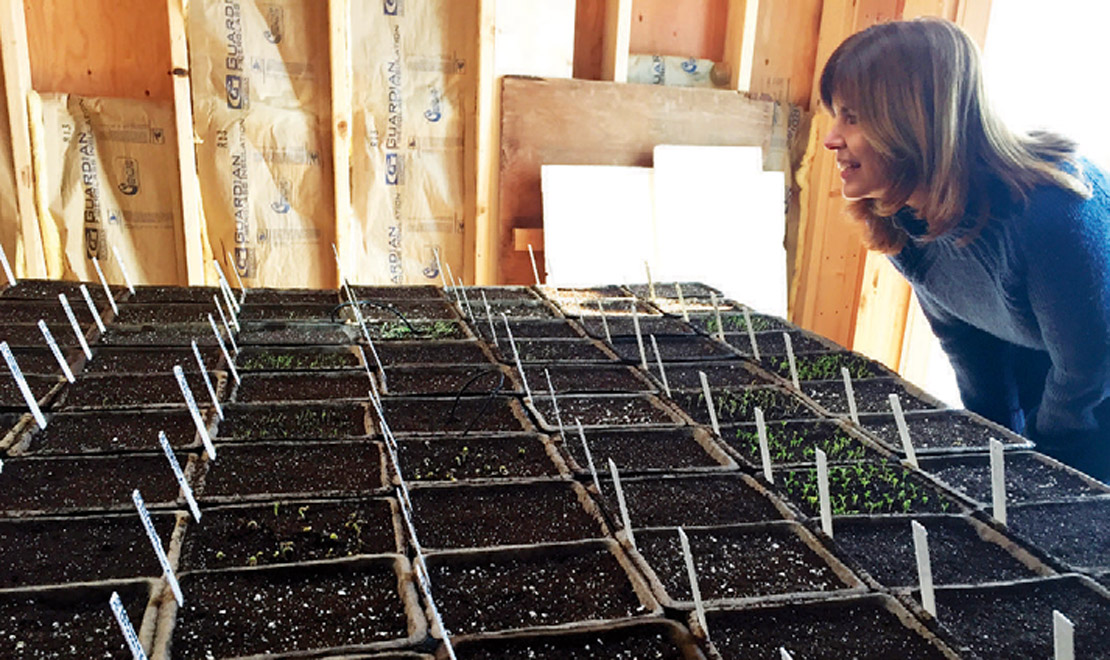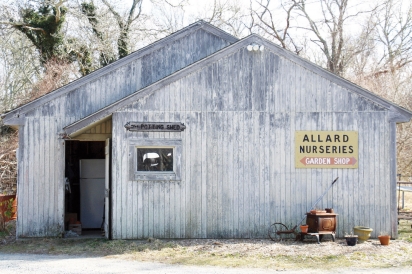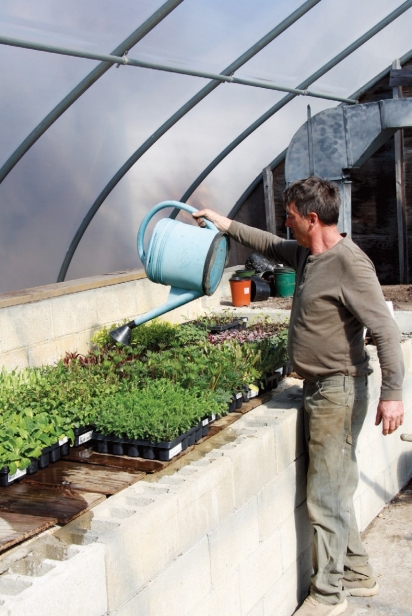Growing Allard Farm
“Virginia was a total hoot!’” says Marjorie McGinnis of her partner John Allard’s mother. Virginia, the matriarch of the family, who passed away three years ago at 93, began Allard Farm with her husband over half a century ago with the purchase of a parcel of land in Brewster, just a few miles east of Cape Cod Bay.
One of the few women who had earned a college degree in her time, Virginia was quite a well-to- do lady in the 1940s. While employed at the Horse and Hound Inn in New Hampshire, a resort catering to clients like Paul Newman and Robert Redford, she met her future husband, Arthur Allard. “My father Arthur was, like Virginia, a total free spirit.” says Allard. “They fell completely in love.”
Chancing a career change in the 1950s, the pair packed up and hauled off to the Outer Cape and were lucky enough to scoop up their Brewster property located between Route 6A and the (now) bike path. “They dug right in” says Allard, “beginning the full-blown nursery they envisioned.” Establishing their business on the shirt tails of what they already knew, Virginia and Arthur taught themselves the rest by trial and error. “Soon there would be kids, all sons, and it became a five-boy operation,” says Allard. “A huge part of it was shrubs and trees. We’d have 150 crab apples and 200 maples at the ready for the landscape trade.”
Over the next fifty years the five brothers’ involvement with the farm varied, but Virginia and Arthur were always there, consistent and strong. He passed away in 1996, and four years later, when profits hit a low, Allard Farms closed its gates. “We just couldn’t keep pace with the prices of the big box stores like Home Depot that had come in at the time,” says Allard.
Allard became a certified aircraft mechanic while in the military stationed in Europe, then sold cars for a while. Returning to the Cape was never in his plan, but like many, he made his way back. His choice of landscaping as a vocation afforded him self-determination and the chance to work outdoors while raising his two children. Allard says, “Now on the farm I find I rely on just about every skill I’ve ever gained from all of my previous careers.” “He really can fix just about anything,” McGinnis agrees.
Eight years ago the two met at the Brewster Chowder House, where she works part time. Like him, she also came back to the Cape. “I was that army brat growing up all over the place, but every summer I was a Brewster girl,” says McGinnis.
About a month after that meeting, she found herself at the helm of a massive clean-out of a family member’s local home which had recently sold. Allard came through. “He’s resourceful and knows a lot of people and worked hard to help me out. We got it done in that one day,” she says. “I started thinking, and even though at the time I wasn’t exactly sure what it might look like, that someday we might work together.”
By the next year, McGinnis had begun helping Allard on a few landscaping jobs. The duo decided to sell starter plants for home gardeners, mostly flowers and herbs. “Our tiny farm stand was by the former Jo Mama’s in Brewster.” she says. “We were thrilled to actually find money in the little metal box we attached to our fanciful little shelves designed to look like mushrooms.”
In 2015 the pair expanded to their current roadside stand on Route 6A near Eldridge Road in Brewster. By now they had perennial and annual flowers, vegetables, a few herbs, and seasoned firewood for sale. This spot still opens seasonally but merely hints at what lies down the road at their current farm and garden center.
Allard Farm’s particular niche hinges on their hoop houses and greenhouse, which allow them to grow seed starts to a marketable size by late spring, as well as their having in-ground space for raising and wintering over perennials, nursery stock and even Christmas trees. Allard says, “Not every nursery on Cape Cod has the opportunities to do these things.” McGinnis adds, “Because this is an established family property, we have low overhead. This keeps our costs down and creates good prices for our local customers.” Allard chimes in, “It also helps that I know nearly everyone in town.”
“When I do need to make small price increases, it goes to increasing our staff, which presently includes only the two of us, and two part-time helpers in the spring and summer seasons,” Allard points out. “They’re awesome. Both do their jobs tremendously well.”
The public’s passion for organically grown produce is leading the pair toward a goal of some year-round produce production. Buying locally also contributes greatly to lowering one’s carbon footprint on the environment. McGinnis says, “We’re fortunate to live in a place where all of this really does matter.”
Bolstering the farm-to-table movement by also selling directly to chefs, Allard hopes to continue working with Mike Ceraldi, of Ceraldi in Wellfleet, who frequents the Allard Farm booth often at the local farmers’ market, selecting items for his ever-changing menu. “It’s all about connections and community,” says McGinnis. “We’re involved in several initiatives that support local scholarships, and we’re doing some workshops for nearby gardening clubs.”
“There’s a real rhythm to a farmer’s year,” she continues. “In the winter, I plan and poke my nose in books; there’s always something new to explore and learn. Then it’s research and seed ordering time. April, May and June, it’s intense work, 12- to 14- hour days. Things slow down in the heat of July and August, only to pick up again in fall.” Most of Allard Farm’s vegetables, annuals and perennials are begun indoors from seed in early February. Because of the relatively short New England growing season, other varieties are purchased as plugs to be raised further in their greenhouses. Some plants like lupines, delphinium and astilbe arrive as bare roots which the pair must pot up. McGinnis keeps meticulous notes, logging dates and recording comments about every batch of seeds for future reference. All are grown as sustainably as possible using organic methods.
The varying day/night weather fluctuations challenge them to maintain greenhouse temperature and humidity. Their wide variety of sprouted seedlings and young transplants need a “hardening off” period, accomplished by exposing them to increasing amounts of outdoor time until they acclimate fully to wind and sun. “On a windy day in spring,” says Marjorie, “being inside a greenhouse is wonderful. You can feel the sun, your skin plumps up from the moisture, and it’s a great place to be. We work hard to keep all the different plants happy.” says Marjorie. “They’re my babies.”
“Initially, our focus was on growing produce, yet we were surprised to also see an interest in vegetable starts for the home gardener,” Allard points out. “Plants like bee balm and butterfly weed are in high demand too for attracting pollinators like bees and birds.”
Popular plants and produce include tomatoes, squash, cucumbers, lettuces and broccoli. In addition, they have firewood year-round, and dark brown mulch, composted on the farm property. “Dig your own into five-gallon buckets, or we can load up your pickup bed with our backhoe,” states Allard. The expanding scale of their operation surprised even close friends walking through the property last summer. There were raised beds for cultivating vegetables, a greenhouse, hoop houses, and rows of tables arranged for different shade requirements, displaying annuals, vegetables, herbs and perennials, with shrubs lined up nearby.
The Orleans Farmers’ Market has been one of their best marketing tools. This will be their fifth season at the Saturday outdoor market (mid-May — mid-November). “It’s been a wonderful venue for us to attend weekly,” Allard asserts. “By no means is it where we do killer business, but it serves as a great way to introduce ourselves to the community. I don’t have to do lots of advertising for it; social media makes it easy. We can show potential customers a variety of plants that we stock so that the market serves as a feeder system sending referrals right down Route 6A to our garden center, often the very same day.”
Last year Allard Farm officially re-launched their garden center with an open house, an early evening celebration of seasonal light bites and varied beverages. Attendees lingered to meander through the nursery as the sun set, cementing this event as an annual one they will host each June; this year’s affair will be held on the 21st, the summer solstice.
Mindful of the sustainability of their farm, Allard and McGinnis are rethinking all the details of their operation, large and small, including investigating both solar and wind as possible components for their energy production. Just a few years in and they have already amassed a supply of seeds for future sowing culled from their own harvests. Generous piles of mature compost (some begun decades ago,) are ready for their own use or for sale to the public, while fresh organic waste material from the farm is piled up to continue the cycle. “We’d really like people to understand just where their food comes from through tours and hands-on activities,” says Allard, “and we’d like to plant apple and pear trees too.”
McGinnis adds, “We envision instructional school visits here, and a library where home gardeners can spend time researching topics that challenge them.”
“It will be really cool when people and their friends can roll right in off of the bike trail to explore, or drop by with Saturday morning cups of coffee to check out our lettuce.” beams Allard, “Not even to buy anything, just to come here as a destination and do a walk around.”
Now that his very competent adult son Tucker Allard is in the final phase of taking over the landscaping components of the business, John Allard will be free to concentrate with McGinnis on their vision for the farm. “We’ll be self-employed with a good part of our year working outdoors. There’s value in small business, in not outsourcing, but in really doing things ourselves. On the good weather days we just work extra hard to make up for the bad days when we won’t be able to,” John declares.
On a Mid-February visit to the recently-purchased home the couple is renovating, the two duck under a sheet of plastic tacked up to a beam, entering a makeshift greenhouse area for seed germination. Rows of pressed cardboard trays rest atop heated grow mats, each containing a perfectly placed plastic tab labelling its name, planting date and year of seed.
“In just a month,” says Allard, “we’ll be moving these little guys out of here, so be sure to stop by the farm and visit them in the cozy greenhouse.” Standing back, he grins, content to watch as McGinnis points to the clusters of sprouting seeds unfurling across the soil’s surface. “This is my happy place,” she declares.
Like Allard Farm’s first founders, Allard and McGinnis love growing together.
Allard Farm
68 Eldridge Road, Brewster
508-896-8306
Mon-Sat 8am-3pm and when the OPEN flag is up; closed Sundays; 2020 Open House on June 21st Booth at Orleans Farmers’ Market mid-May through mid-November







